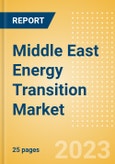The Middle East's power market continues to be dominated by traditional fossil fuels and this is unlikely to change for the foreseeable future, with gas based thermal power providing the majority of power generation into 2035. However, the power generation outlook shows that renewables will experience a strong growth, increasing at a CAGR of 11.3% between 2023 and 2035. Most of the increase will come from solar energy, reaching 18% of the total mix by 2035. Meanwhile, the adoption of electric vehicles as a means of reducing CO2 emissions has progressed in the region in the last few years. This progress is still heavily concentrated in the Gulf region, however. Given the extensive scale of oil and gas operations in the region and the need for achieving zero-emissions targets, the CCS/CCU projects are gaining more momentum. The CCS capacity in the Gulf countries currently stands at 4mtpa, representing 10% of the global annual capacity. Similarly, the Middle East region is situated in an advantageous position when it comes to potential hydrogen production due to its abundant gas reserves, land, and solar radiation. There are currently multiple hydrogen projects in the feasibility phase, with most of them are expected to be operational around the middle of the current decade.
Key Highlights
- Renewable energy policies and targets from Middle Eastern Countries
- Renewable share in Middle East's power capacity share
- Major players in the Middle East's renewable energy market
- Regional electric vehicle policies
- CCUS capacity in the Middle East 2018 - 2030
- Upcoming hydrogen plants and their end use sectors
Scope
- Renewables shares of GCC countries from 2020 to 2035
- Regional policies supporting renewable energy, electric vehicles and CCS technology
- Regional partnerships and financial incentives in hydrogen production
- Decommissioning and upcoming thermal capacity outlook from 2023-2030
Reasons to Buy
- Obtain the most up to date information on recent developments and policies in the Middle East energy transition
- Identify opportunities in upcoming projects involving electric vehicles, solar and wind power generation, EVs, CCS and hydrogen production in the Middle East
- Assess competitors based on their active and pipeline capacities for renewable energy generation, CCS/CCU projects and hydrogen projects
- Develop business strategies by identifying the most promising sectors for future growth
Table of Contents
- Executive Summary
- Sector Grid and Leaders
- Power Outlook & Generation
- Renewable Energy: Policies & Economics
- Power Capacity Outlook Share
- Share of Power & Renewable Generation
- Share of Renewable Generation in GCC Countries
- Thermal Power Decommissioning & Emissions
- Major players: Solar Vs Wind Owners
- Electric Vehicles
- Regional Policies
- Regional Projects
- CCS/CCU
- CCS/CCU Policies
- CCS/CCU Projects
- Hydrogen
- Regional Policies
- Hydrogen Production in the Middle East
- Financing opportunities for hydrogen
- Intended Use Sectors for Hydrogen
- Likely Demand Sectors for Future Growth
- Contact the Publisher
Companies Mentioned (Partial List)
A selection of companies mentioned in this report includes, but is not limited to:
- Acwa Power
- ACME
- Abu Dhabi Power Corporation
- Mubadala
- Mowasalat
- ABB
- Karwa
- ADNOC
- Saudi Aramco
- Al Reyadah
- OQ
- InterContinental Energy
- National Technology Enterprises Company
- Power Construction Corporation of China
- China National Machinery Industry Corp
- Abengoa SA
- JinkoSolar Holding Co Ltd
- LONGi Green Energy Technology Co Ltd
- Zhejiang Chint Electrics Co Ltd
- Vestas Wind Systems AS
- General Electric Co
- Saipem SpA
- Siemens AG
- Mays Motors
- Lucid Motors
- Hyzon Motors
- Eni
- Engie
- Masdar
- Fertiglobe
- TAQA
- CPC Corp
- Dutco Group of Companies
- Air Products and Chemicals Inc
- Neom Co
- LCY Chemical Corp
- QatarEnergy
- Petroleum Development Oman
- Emirates Stee
- Saudi Power Procurement Co
- Air Products and Chemcials Inc
- Air Products Qudra
- Softbank Group
- Dubai Electricity and Water Authority
- QatarEnergy
- Saudi Aramco
- Exxon Mobil Corp
- National Oil and Gas Authority of Bahrain
- Kuwait Petroleum Corp
- Occidental Petroleum Corp
- Linde
- Scatec ASA
- H2 Industires
- Hydrogen Rise AG
- Hyzon Motors.








